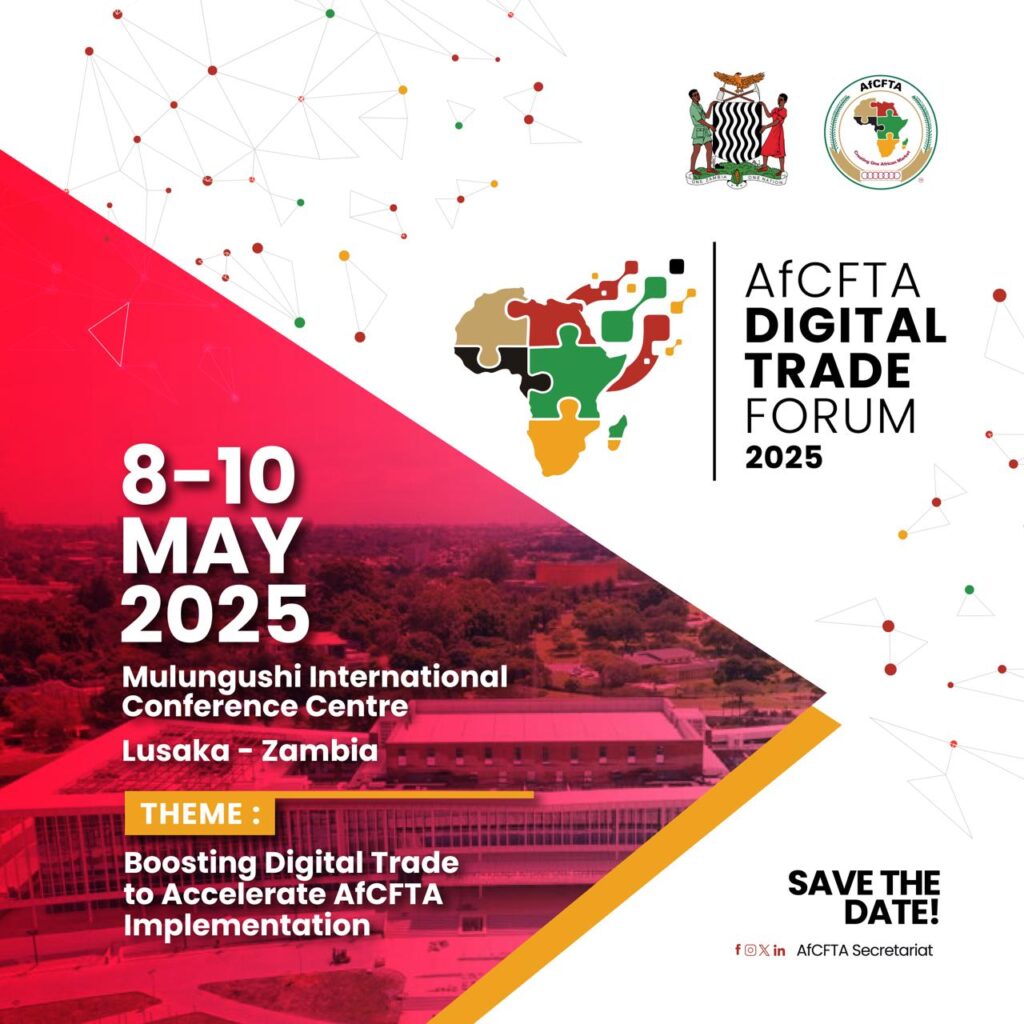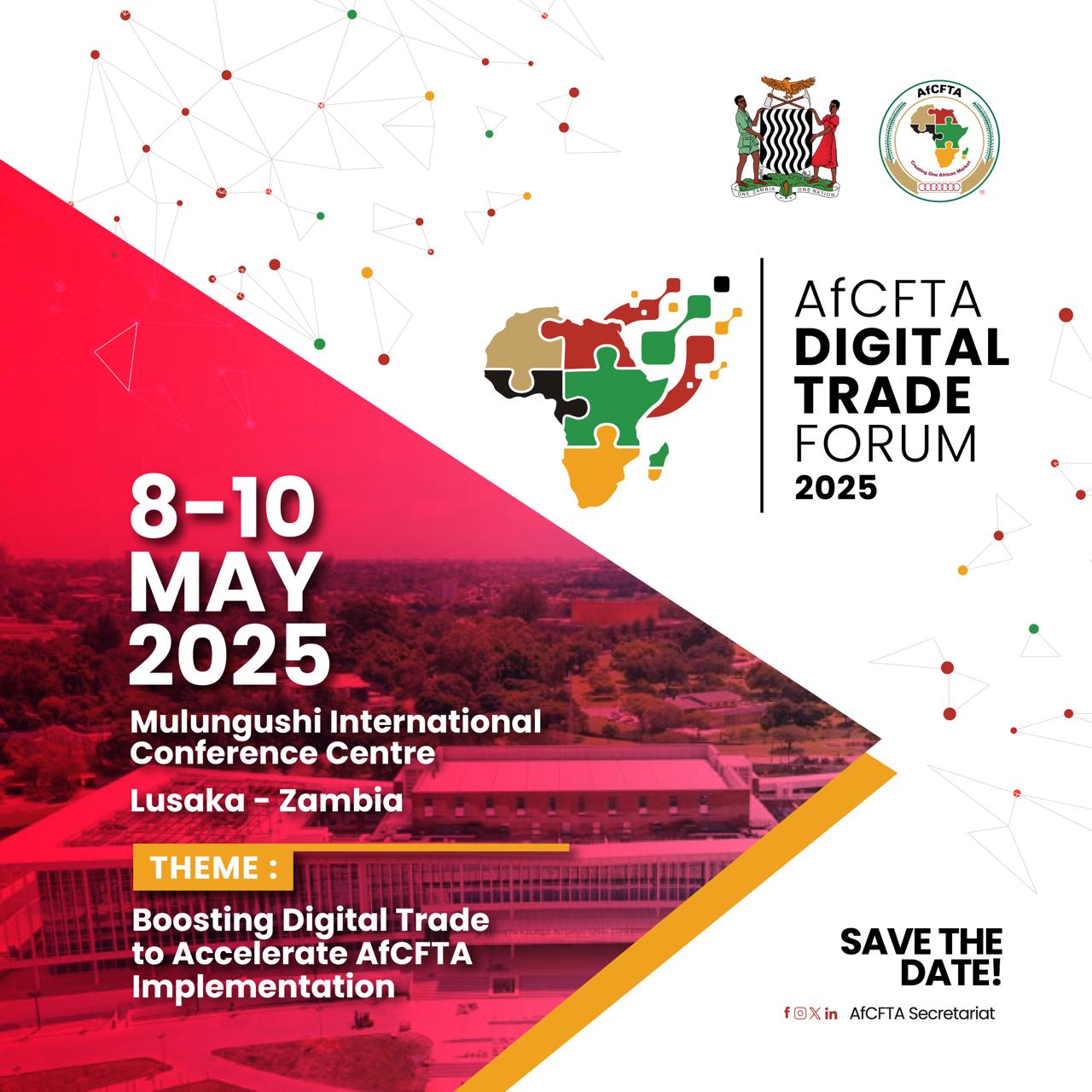
By Baboloki Semele: Lusaka is set to be the epicenter of Africa’s digital trade revolution as it hosts the much-anticipated AfCFTA Digital Trade Forum 2025. From 8–10 May 2025, leading policymakers, digital innovators, business leaders, and trade experts will converge to explore new frontiers in boosting digital trade to accelerate AfCFTA implementation.
At the AfCFTA Digital Trade Forum 2025 it is anticipated for real conversations to lead to real opportunities, bringing together the doers, the builders, and the innovators who are actively shaping the continent’s trade landscape. Participants will engage in thought-provoking discussions on how digital trade can drive seamless cross-border commerce, enhance supply chains, and create a unified African digital marketplace.
Why Digital Trade Matters for AfCFTA Implementation
The African Continental Free Trade Area (AfCFTA) is one of the Flagship Projects of Agenda 2063 Africa’s development framework. The AfCFTA was approved by the 18th ordinary Session of Assembly of Heads of State and Government, held in Addis Ababa, Ethiopia in January 2012 which adopted the decision to establish an African Continental Free Trade Area and the Action Plan for Boosting intra-African trade as a key initiatives whose implementation would promote socio-economic growth development . The AfCFTA aims at accelerating intra-African trade and boosting Africa’s trading position in the global market by strengthening Africa’s common voice and policy space in global trade negotiations.
The objectives of the AfCFTA are to:
- Create a single market for goods, services, facilitated by movement of persons in order to deepen the economic integration of the African continent and in accordance with the Pan African Vision of “An integrated, prosperous and peaceful Africa” enshrined in Agenda 2063;
- Create a liberalised market for goods and services through successive rounds of negotiations;
- Contribute to the movement of capital and natural resources and facilitate investments building on the initiatives and developments being undertaken by the State Parties and RECs;
- Lay the foundation for the establishment of a Continental Customs Union at a later stage;
- Promote and attain sustainable and inclusive socio-economic development, gender equality and structural transformation of the State Parties;
- Enhance the competitiveness of the economies of State Parties within the continent and the global market;
- Promote industrial development through diversification and regional value chain development, agricultural development and food security;
- Resolve the challenges of multiple and overlapping memberships and expedite the regional and continental integration processes
The Agreement establishing the AfCFTA was signed on 21st March in Kigali, Rwanda. The AfCFTA entered into force on 30th May 2019 and the Operational Instruments governing trade under the AFCFTA regime were launched in Niamey, Niger in July 2019. Trading under the AfCFTA regime commenced on 1st January 2021.
Protocols to the Agreement Establishing the AfCFTA include:
- The Protocol on Trade in Goods
- The Protocol on Trade in Services
- The Protocol on Rules & Procedure on the settlement of disputes
- The Protocol Investment.
- The Protocol on Intellectual Property Rights
- The Protocol Competition Policy,
However, achieving this ambitious goal requires a strong digital trade ecosystem that eliminates barriers and facilitates efficient, technology-driven commerce.
The forum will focus on key themes, including:
- E-commerce and digital payments: Overcoming challenges to online transactions across African borders.
- Fintech and financial inclusion: Leveraging digital tools to bridge the trade financing gap.
- Data governance and digital policies: Establishing a regulatory framework for cross-border digital trade.
- Tech innovation for trade facilitation: How AI, blockchain, and digital platforms can streamline AfCFTA implementation.
- SMEs and digital trade: Ensuring small businesses benefit from Africa’s growing digital economy.
The AfCFTA Digital Trade Forum 2025 will provide a unique space for policymakers to engage with tech pioneers, investors, and trade experts. Government representatives, startup founders, financial institutions, trade associations, and international organizations will have the opportunity to collaborate on policies that can accelerate Africa’s digital trade agenda.
